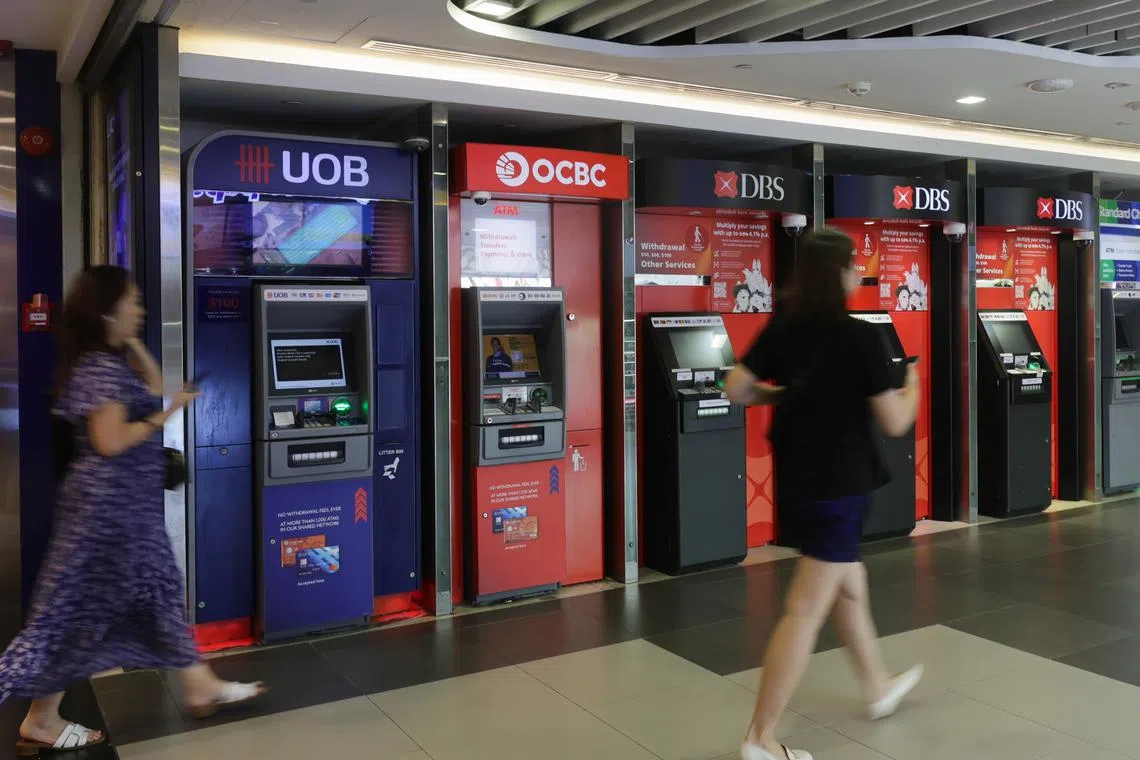Singapore banks make headway on programmable digital money trials
Sign up now: Get ST's newsletters delivered to your inbox

DBS Bank, OCBC Bank and UOB waded into blockchain and digital currencies in 2016 with government-led Project Ubin.
PHOTO: ST FILE
SINGAPORE – Blockchain technology may not be new, but it heralds the start of a new era in the financial world and has fired up global excitement among central banks and financial institutions, including Singapore’s three local banks.
This is especially so as 2024 looks like a promising year for breakthroughs, which have so far been elusive, in how the technology is applied to solve real-world problems.
In particular, pilot programmes linked to purpose-bound money (PBM) look encouraging.
PBM is a form of tokenised digital currency that allows issuers to set specific conditions on how it is used.
Currently, OCBC Bank and UOB are looking at how PBM can be programmed to maintain the fungibility of digital money across different digital money issuers, or how digital money can be traded or exchanged for one another.
“We’re now at a stage where once we figure out the legal structures, we will be close to actually trying to launch it,” OCBC’s head of global transaction banking Melvyn Low told The Straits Times in an interview.
Mr Leong Yung Chee, who heads blockchain and digital assets at UOB, said that following the success in the first phase where the trial was done in a closed environment, the bank is moving to the next stage where it will try out its digital Singdollar with OCBC’s in an open environment.
Wholesale central bank digital currencies (CBDCs) will be the common settlement asset in this test.
Wholesale CBDCs are digital currencies issued by a central bank. They are to be used only by central banks, commercial banks or other financial institutions to settle large-value interbank transactions.
Market players said PBM can play a role in government disbursements as it can be programmed to allow money, goods and services tax rebates or care subsidies to be disbursed to people when needed.
Mr Lim Soon Chong, DBS Bank’s group head of global transaction services, said: “Beyond (government) vouchers, we foresee PBM technology enabling new capabilities and efficiencies in areas such as consumer rewards, donations, grant disbursements and financing.”
For instance, PBM can come in handy as Singapore moves to eliminate cheques in the coming two years.
OCBC’s Mr Low envisions a future where cheques are replaced with a QR code. “So, you don’t need the cheque infrastructure to take a picture of the cheque for clearance or go to a central clearing house. You can just present your QR code,” he said.
However, the PBM use case in Singapore may not sound as interesting, given that there are only about 30,000 people here unbanked, he said, adding that in other countries such as Indonesia, which has almost half of its population unbanked, “this will be the absolute killer solution”.
The three mainboard-listed banks – DBS, OCBC and UOB – waded into blockchain and digital currencies in 2016 with government-led Project Ubin, which explored the use of blockchain for clearing and settlement of payments and securities.
They are now working on various trials involving digital currency transactions under Project Orchid, and the tokenisation of liabilities and assets under Project Guardian.
Tokenisation is the process of issuing a digital representation of an asset on a blockchain.
A key theme around the trials is payment, which is a core function of banking.
As more digital assets come on stream in the years ahead, UOB has to future-proof itself with blockchain technology so it can participate effectively in capital markets, said Mr Leong.
Already, Monetary Authority of Singapore (MAS) outgoing chief Ravi Menon said in mid-November at the Singapore Fintech Festival that the MAS team will start developing CBDCs for wholesale interbank settlement in 2024.
In terms of asset tokenisation, Mr Leong said UOB’s focus is on industry-led initiatives such as Project Guardian’s latest pilot to design digital infrastructure to host tokenised assets and applications.
Mr Menon had said MAS is working with the financial industry to develop an interlinked network model (INM) or a common framework for exchanging digital assets across independent networks. This is significant as it enables financial entities to transact with one another without the need for all of them to be on the same network.
DBS, which is taking part in the INM initiatives, has been looking at cross-border payment frictions.
Ms Evy Theunis, who heads digital assets at DBS’ institutional banking group, said the pilots under Project Guardian demonstrated that financial markets can achieve real-time, round-the-clock settlement with blockchain technology, while abiding by security and compliance rules.
OCBC’s Mr Low noted that for cross-border transactions on the blockchain, the next step is to look at specific aspects such as sanction screening and if the way payments go into different countries can be improved.
He said this could then potentially mean that businesses can make faster wholesale payments of larger amounts.
“I am looking to test with countries like Malaysia, because that’s where a lot of requirements are needed in order for you to make a payment. But in order to do that, we need to get both Bank Negara and MAS together, so we’re in progress to just try and see how we can do it,” he said.
In the months ahead, all eyes will be on whether banks, financial institutions and regulators can find the right use cases and put enough effort into driving them.
Mr Leong said there is still much hard work to be done to put in place effective regulation, prudent treatment and adequate risk mitigation.
He added that consumer education and protection are vital, so that the public is aware of the risks and rewards of blockchain and digital assets.
DBS, OCBC and UOB investing in blockchain technology for digital finance
The three local banks are putting money in blockchain technology as they prepare for the future of digital finance.
The Straits Times looks at what areas of digital currency and cross-border payments DBS Bank, OCBC Bank and UOB are focusing on.
Project Ubin:
Started in 2016, the project, which included DBS, OCBC and UOB, was an industry initiative to explore the uses of blockchain technology for the clearing and settlement of payments and securities.
In 2021, DBS, Singapore investment company Temasek, J.P. Morgan and Standard Chartered Bank set up Partior, an open blockchain-based platform that enables faster and more secure cross-border value transfers.
Project Orchid:
In the first phase of the project, ride-hailing operator Grab, UOB and fintech firm Fazz tested the use of purpose-bound money (PBM) for programmable rewards.
In November 2022, DBS and the Government Technology Agency tried out the use of PBM for disbursements to selected individuals. Participants used RedeemSG vouchers at selected food and beverage outlets.
OCBC and the Central Provident Fund Board in 2022 tested the use of PBM for funds disbursement from government agencies, without requiring recipients to have a bank account.
In the second phase, DBS, HSBC and Amazon are looking at encoding disbursement conditions for tokenised payables to meet the financing needs of sellers.
OCBC and UOB are moving their digital Singdollar fungibility trial to an open environment. It comes after they successfully tested the feasibility of enabling tokens issued by one bank to be accepted for retail payments by another in a closed environment.
UOB is also involved in the Singapore Pitstop Pack and SkillsFuture Singapore PBM prototype, where the bank developed capabilities to tokenise the Singdollar to facilitate on-ramp and off-ramp transactions.
Project Guardian:
The first pilot was announced in May 2022, led by DBS, J.P. Morgan and Marketnode. It explored potential decentralised finance applications in wholesale funding markets. Marketnode, backed by the Singapore Exchange Group and Temasek, is a digital markets infrastructure operator.
In November 2022, DBS, J.P. Morgan and SBI Digital Asset Holdings tested for the first time foreign exchange and government bond transactions against liquidity pools comprising tokenised Singapore Government Securities bonds, Japanese government bonds, Japanese yen and Singdollars.
In November 2023, DBS, SBI and UBS launched the world’s first live repurchase transaction, also commonly known as repo, with a natively issued digital bond on a public blockchain.
The same month, BNY Mellon and OCBC said they will try out a cross-border foreign exchange payment product to enable secure payment across networks of different origins.
UOB is now focused on one pilot for wealth management products and is considering several others.
Others:
In June 2021, UOB piloted a digital bond issuance on Marketnode’s platform, making it the first financial institution in Singapore to tokenise a capital security.
In October 2021, UOB and digital securities exchange ADDX concluded the digitisation and digital custody of the inaugural sustainability-linked digital bond launched by Sembcorp Industries.
In December 2021, OCBC conducted a US$100 million (S$133.2 million) euro-denominated commercial paper issuance – the first transaction on Marketnode’s platform.
In 2022, UOB invested in a minority stake in ADDX.
In May 2023, OCBC partnered ADDX to distribute its first tokenised equity-linked structured note to accredited investors.
In July 2023, DBS said it was one of the first foreign banks in China to launch an e-CNY merchant collection solution and to complete an e-CNY transaction for a client. The solution allows corporate clients of DBS China to collect payments from their customers in e-CNY, a digital currency issued by the People’s Bank of China.



